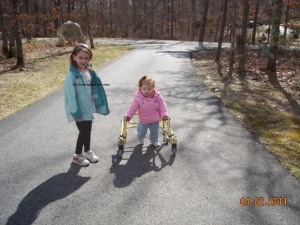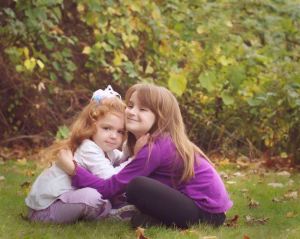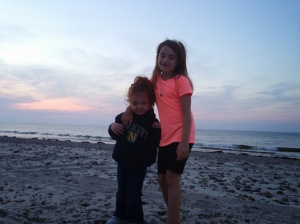It took having a second child for me to understand that disability did not mean inability. I am guilty, like many others, of seeing the chair before the person in it. I would look at those with a disability and not see the person first.
After my second daughter was born my definition of disability was reborn. This wasn’t a child to be pitied or thought to be unable. This child could accomplish anything she set her mind to, whether it was walking or climbing up the wrong side of the stairs. She would defy doctors and our own expectations too often for us to begin putting limits on her ability. I wanted everyone to see Bridget, not the things that set her apart from her peers.
 However having a child with a disability wasn’t how I learned to “see” the person first.
However having a child with a disability wasn’t how I learned to “see” the person first.
It was having a child without a disability. When Bridget was in the NICU, Abby saw first-hand how scary this long awaited baby sister would change our lives. Abby has spent countless hours in waiting rooms doing her homework while her sister is doing her therapy. She has always known her sister had “special needs” but characterized it as just another quirk, like Bridget’s red hair. One would think this inequity would lead to either jealousy or disdain. But the opposite is true.
The long hours she has spent caring for her sister has created an empathetic soul. One who slows down to her sister’s pace not because she has to, but because she wanted to walk with her sister. Abby will unthinkingly adapt a playground activity so a friend who cannot run as fast as the others will be able to participate with her classmates at recess.
Early on Abby created her own narrative about her sister. She would tell classmates (and teachers) that Bridget had a ‘funny’ pattern in her brain or that it just took Bridget longer to do things. When asked about including her sister in events, Abby’s first response is: of course, she is my sister! Abby redefined special needs to be anything that makes life harder for her sister and others. It was through watching Abby nurture her sister that I began to see a pattern forming.
Abby treats all children as if they are able. Abby may question why a person is using a cane or a child may act in a disruptive manner, which is only natural. She will inquire in a way so as not to embarrass herself or the person who has prompted the question. What is not natural is her unwavering ability to see the person first, disability second.
Recently Abby was at a 4H visual presentation. A child with Down syndrome got up to present and encountered difficulty managing her posters. The 4H presentation must be conducted solo, without parental assistance. The judges showed kindness and asked the child if they required assistance. Eyes full of nerves the child said yes please. The judges had barely finished giving permission when Abby was out of her seat asking the girl what she needed.
She did not tell the girl how she was going to help; she asked the girl how she could be of help. Abby asked the girl where she wanted her to stand. She asked the girl what sequence the girl wanted to posters in. And after the presentation was finished she asked the girl if she was okay with how Abby helped her instead of letting the girl’s friends assist her. (Thankfully the answer was yes)
Abby might have been giving a speech about rabbits that evening.
But I learned something much more important. Too often I see someone with a disability and move quickly to assist. I never follow the steps Abby displayed naturally:
- Ask if they need/want help
- Ask how we can help
On the drive home I told Abby how proud I was that she stepped up to help. She replied, of course mom (with an exaggerated sigh). Then she asked if the girl had special needs, like Bridget. When I replied yes, Abby said she thought so but she wasn’t sure until she sat back down. Abby took my breath away when she added, she just looked as nervous as I felt.
When Abby looked at the girl on stage she didn’t see a girl with Down syndrome. She saw a girl on stage that was nervous and thought she might have special needs. It wouldn’t have mattered if the girl did or did not, Abby would have reacted the same way.
The way we all should: see the person first and offer assistance.





Abby we love you! You sound just like my Pepper and it makes me so proud xxxx we hope you girls get to meet one day xx
LikeLike
They MUST meet someday!
LikeLike
Chills just ran down my spine. Your Abby is such an incredible girl! She handled that situation with more eloquence and kindness than most adults would have. As a person with a disability I just would like to chime in and add my thanks…because she is teaching the world how to treat others. Too often I find that I don’t need assistance and even after I politely decline, people INSIST upon helping me – and while I appreciate their willingness to be of assistance, sometimes I just want to be able to do things for myself. And then there are other situations where I find myself wishing that somebody would help me out.
Thank you, Abby, for being the one to step up. This post is so beautiful. And you know what I think is even more beautiful? That she didn’t see that this child had a disability at first…All she saw was a little girl in need, and disability or not, we ALL need help sometimes. xo
LikeLike
It’s funny I thought of you when I saw how Abby reacted. I thought, gosh she must have read K’s post (but she’s not online so that couldn’t have happened). I think it is just something in her make-up, something I cannot even take credit for but am happy to see blossom.
LikeLike
Okay, I am crying. The was beautifully written, and Abby is an amazing young woman – if only we all could be more like that!
LikeLike
CRAP! I hate when I make you cry!!!
LikeLike
I love Abby. How awesome that she saw a girl who looked nervous and she wanted to help. A lesson for all of us.
LikeLike
Absolutely gorgeous post: the photos are so moving and both your daughters are amazing xx
LikeLike
Thank you. It was funny going through the pictures. Abby is always in the back ready to catch Bridget if she needs her.
LikeLiked by 1 person
Abby is a superstar and FAR more filled with empathy and understanding than I think I can ever hope to be. Kudos to her for being so brave and willing to stand up and offer help.
LikeLike
I know, right? She amazes me daily. She also frustrates me nightly, so the amazing is really important 🙂
LikeLiked by 1 person
Hehehe yeah true dat!
LikeLike
Aw! We can all learn from Abby. What a great kid.
LikeLike
Beauty in truth – truth in beauty – Isn’t it great when our kids show how cool being human can be? I love this so much and I’m so glad you shared it.
LikeLike
Yes, yes it is. We always think it is our job to teach them. But once in a while, they take on the role of quiet teacher.
LikeLike
My two older siblings are the most empathetic and sincere people I’ve yet met and, if having my younger brother and I as their siblings with a disability contributed to that in any way whatsoever, I would be pleased. Not sure of that, but it’s lovely to read about other sibling relationships like this, either way.
🙂
LikeLike
Thank you so much for stopping by! I bet if asked, they would not even see your disability first or realize at all that it has changed their world view. Which is awesome and incredible and organic.
LikeLiked by 1 person
just spending time with Abby has made Sabrina react differently to Kelly. She is truly an inspiration to all kids! Love her !!!
LikeLike